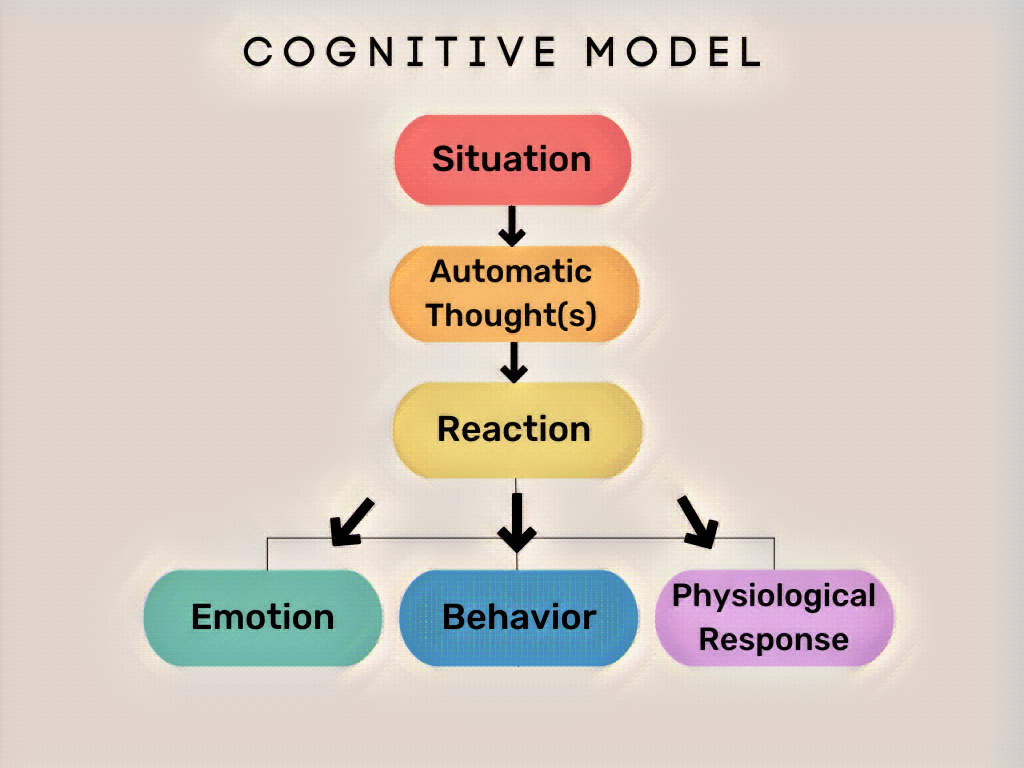How can CBT Help?
How Cognitive Behavioral Therapy (CBT) Can Help
What Is Cognitive Behavioral Therapy (CBT)?
Cognitive Behavioral Therapy (CBT) is based on the idea that a person’s reaction to a situation is more influenced by their perception of the event rather than the event itself. When individuals are upset or stressed, their perceptions can become distorted. CBT assists people in recognizing these distressing thoughts and beliefs, allowing them to assess whether these thoughts are realistic or dysfunctional. Through this process, they learn strategies to adjust and transform their distorted thinking patterns.
By adopting more realistic thought processes, individuals often experience improved emotional well-being. CBT also focuses on problem-solving and promoting behavioral changes. It is a structured, time-limited, and present-focused form of psychotherapy that has undergone extensive scientific testing, with over 2,000 studies confirming its effectiveness in treating a variety of health and mental health issues. When properly applied, CBT helps individuals improve their condition and maintain those improvements over time. (n.d.).Beck Institute. Retrieved June 2022, from https://www.beckinstitute.com
Reach out to us here to schedule or to learn more about how we can help.
Does CBT Work?
Cognitive Behavioral Therapy (CBT) is one of the most thoroughly researched forms of psychotherapy and counseling. In the 1960s and 1970s, Dr. Aaron Beck, the pioneer of CBT, recognized the importance of scientifically validating his innovative approach. In 1977, Dr. Beck and his team published a groundbreaking randomized clinical trial comparing CBT to antidepressant medications. This study marked CBT as the first “talk therapy” proven to be more effective than medication for treating depression.
In 1981, a research group in the UK published another study with similar results, reinforcing CBT’s effectiveness. Since then, Dr. Beck’s work has been consistently replicated and expanded. Over 2,000 studies since the 1980s have confirmed the efficacy of CBT in treating psychiatric disorders, psychological issues, and medical conditions with psychological components. Explore more about CBT’s effectiveness through resources like the Beck Institute here at the research corner. (n.d.).Beck Institute. Retrieved June 2022, from https://www.beckinstitute.com
What are CBT Sessions like?
CBT treatment is personalized for each person, crafted to align with the unique needs of the client. An authentic CBT treatment plan thoughtfully considers the client’s objectives, values, current issues, symptoms, and demographic factors like culture, religion, language, and sexual or gender identity. Although certain components of CBT are consistent across various groups and environments, the approach is customized to fit the distinct circumstances of each individual. (n.d.).Beck Institute. Retrieved June 2022, from https://www.beckinstitute.com
The Cognitive Model:

Cognitive Behavioral Therapy Resources
Books & MultiMedia
- Beck Institute Recommended Reading List for Individuals
- The Humanism of Recovery-Oriented Cognitive Therapy: A Dialogue with Paul Grant & Ellen Inverso
- Exploring CBT: The Litmus Test of Thoughts & Beliefs (With Dr. Norman Cotterell)
- Dr. Judith Beck Explains How Everyone Could Benefit from Learning CBT
- Life Wisdom from Dr. Aaron Beck
- The Power of Realistic Thinking in CBT
- Needing to Know for Sure: A CBT-Based Guide to Overcoming Compulsive Checking and Reassurance Seeking
- Feeling Good: The New Mood Therapy
- Anxiety Free: Unravel Your Fears Before They Unravel You
- The Mindfulness Workbook for OCD: A Guide to Overcoming Obsessions and Compulsions Using Mindfulness and Cognitive Behavioral Therapy (New Harbinger Self-Help Workbook)
- The Boy, the Mole, the Fox and the Horse
- The OCD Stories
- The Big Silence
- Introducing: Unlocking Us – with Brené Brown
Articles & Press
- Stop “Should-ing” on Yourself
- How to Be More Decisive
- 3 Ways to Stop Comparing Yourself to Others, According to a Cognitive Scientist
- If you know someone who is incredibly dramatic and desperately craves attention, they may have HPD
- The Age of Reopening Anxiety
- How Cognitive Behavior Therapy May Help Suicidal People
- Aaron Beck turned the world of psychiatry upside down
CBT Resources for Marriage & Couples
CBT Resources for Eating Disorders
How Cognitive Behavioral Therapy (CBT) Can Help
What Is Cognitive Behavioral Therapy (CBT)?
CBT is founded on the theory that the way a person perceives a situation is more closely connected to their reaction than the situation itself. A persons’ perceptions are often distorted when upset or under stress. Cognitive Behavioral Therapy helps people identify their distressing thoughts and beliefs to evaluate how realistic and/or dysfunctional they are. Then they learn tools that help to change and modify their distorted thinking and beliefs.
When they think more realistically, they feel better. The emphasis is also consistently on solving problems and initiating behavioral changes. Cognitive Behavioral Therapy (CBT) is a time-sensitive, structured, present-oriented psychotherapy that has been scientifically tested and found to be effective in more than 2,000 studies for the treatment of many different health and mental health conditions. When implemented correctly, CBT helps individuals get better and stay better.
Have Questions?
Review our FAQs or contact us to learn more.
